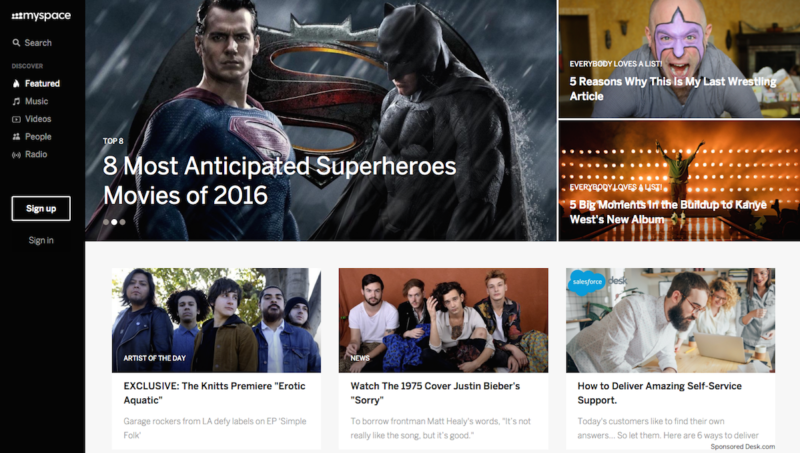Time Inc. Acquires Myspace-Owning Viant, Readies To Battle Facebook And Google
The combined entity says it now can offer access to a massive list of identified first-party customers, plus premium ad inventory.
Today, Time Inc. announced it has acquired ad tech firm Viant, owner of Myspace. This deal, according to Viant’s top executives, creates a quality ad environment that rivals Facebook’s and Google’s.
“This acquisition is game changing for us,” Time Inc. Chairman and CEO Joe Ripp said in a statement.
The Irvine, California-based Viant, which changed its name from Interactive Media Holdings a year ago, owns the social network Myspace and claims it has access to 1.2 billion identified and registered users.
It also has the Specific Media ad network and agency, the Vindico video ad management platform, the smart TV system Xumo, and, launched a year ago, an Advertising Cloud with an Identity Management Platform.
Time Inc. has more than 90 brands, including its namesake magazine, Sports Illustrated, Fortune, People and Entertainment Weekly.
Together, CEO Tim Vanderhook told me by phone, Time and Viant can offer a massive database of identified first-party customers plus premium ad inventory space.
The combined company, he claimed, will have access to at least one identified user in 95 percent of American households, utilizing more than 200 million identified users in the US alone. He declined to provide the worldwide stats.
What Time Gets
“Marketers are flocking to first-party data and quality inventory,” Vanderhook said. He primarily means logged-in, identified first-party users.
First-party users can also include anonymous visitors to a publisher’s website, but they’re a rung down on the ladder for marketers because tracking them is more dependent on making inferences based on behavioral and other data.
“Now with Time Inc., our identified first-party data is bolstered,” he said, referring to the addition of Time’s subscribers.
The “quality inventory” he mentions, of course, is the ad space on Time’s properties, as well as on Myspace. Vanderhook points out that advertisers are frequently burned by ad fraud or issues relating to ad viewability. Both of those problems can often be traced to where the ad was placed.
Open programmatic exchanges might place your ad on shady websites, for instance, and those shady websites could be a factor in why you’re paying for an ad that isn’t shown properly to actual humans.
COO Chris Vanderhook told me that Time gets three major benefits out of the deal.
There’s the ability for advertisers to match their subscribers against the combined Viant/Time identified subscribers for cross-targeting or lookalike matching, not unlike Facebook’s Custom Audiences match.
There’s Viant’s cross-device identification, which determines that the registered and identified you is the same person on this smartphone, this laptop, this tablet, and potentially other devices. Chris Vanderhook said Time didn’t have that capability previously.
“Future Is Targeting Real People”
And there’s Viant’s ability to attribute sales in physical retailers back to online ad impressions, a level of real-world attribution that matches online identity to credit card usage — a capability that the Vanderhooks say Time also didn’t have.
Facebook and Google have dominated the online ad market, they said, because of their access to first-party customer data and premium ad inventory. Viant does handle anonymous user targeting for advertisers, but it considers identified users as its chief treasure.
“The future is targeting real people, not anonymous ones,” Tim said, because it’s more accurate and produces greater results.
Terms of the deal were not made public. The companies said that Viant will continue to operate as an independent business.
Contributing authors are invited to create content for MarTech and are chosen for their expertise and contribution to the martech community. Our contributors work under the oversight of the editorial staff and contributions are checked for quality and relevance to our readers. MarTech is owned by Semrush. Contributor was not asked to make any direct or indirect mentions of Semrush. The opinions they express are their own.
Related stories
